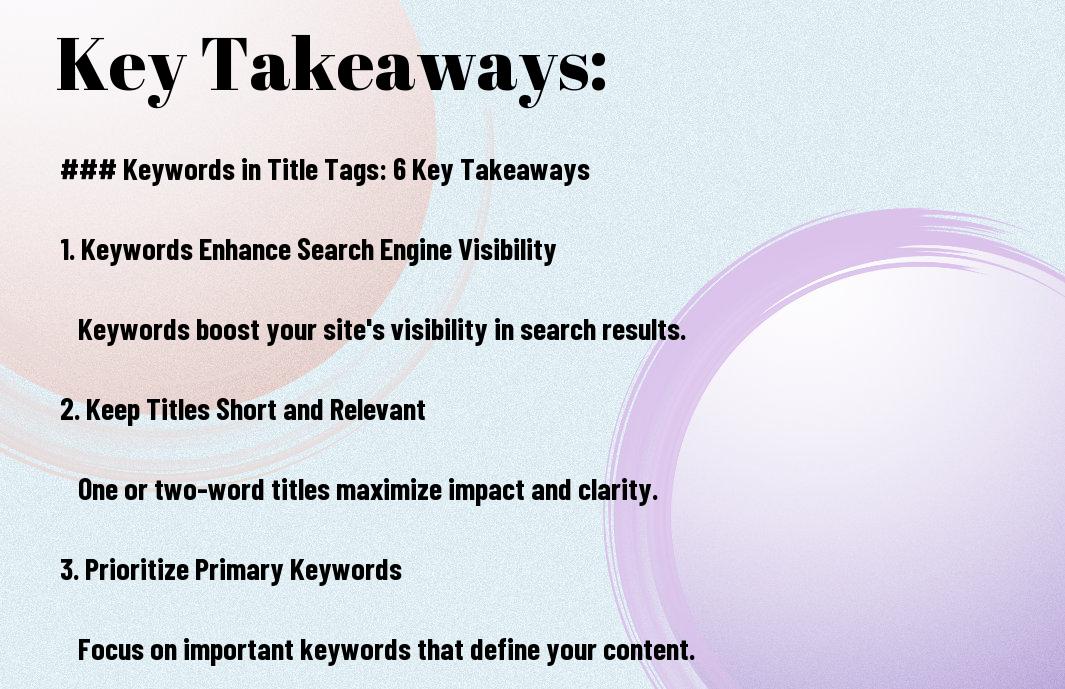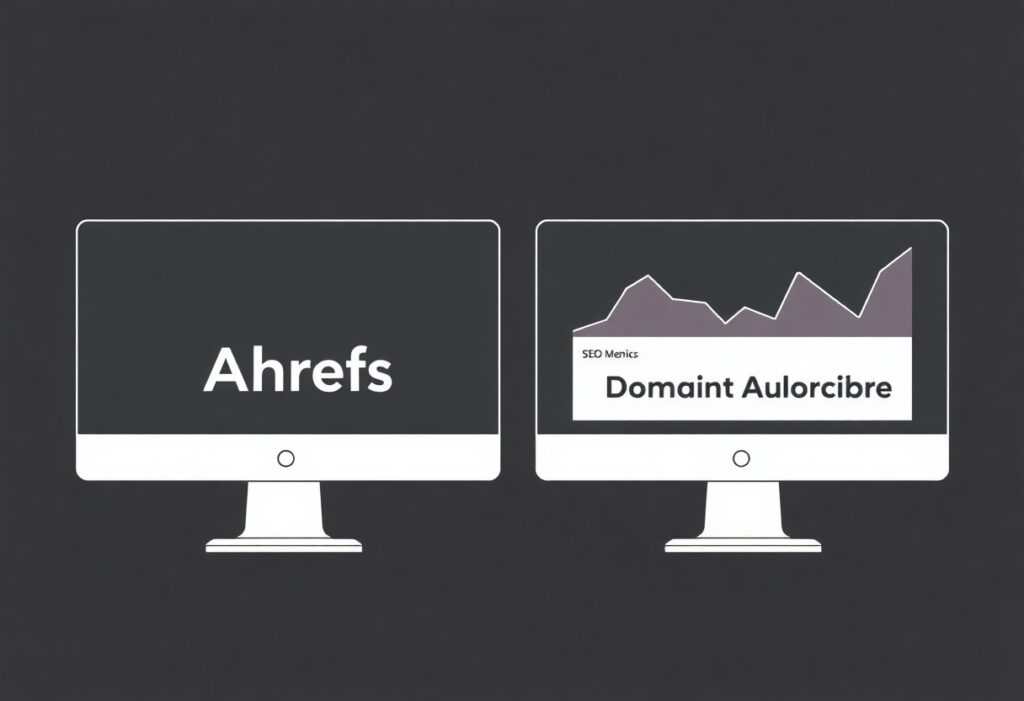Just like a sturdy foundation supports a building, incorporating keywords into your title tags lays the groundwork for your SEO success. As you venture into digital marketing, your title tags play a crucial role in visibility and ranking. By using one or two effective words, you can significantly improve your website’s performance. Start by identifying the right keywords that resonate with your audience. Additionally, keep your titles concise and direct, making it clear what users can expect. When you incorporate keywords strategically, you enhance your chances of dominating search results. Be proactive with Rank Authority to leverage AI and boost your online presence.
Importance of Title Tags
The integration of keywords into your title tags is necessary for achieving optimal visibility on search engines. Title tags serve as the first impression for visitors and search engines alike. A well-structured title tag not only summarizes your content but also influences whether users will click through to your website. To maximize your chances of ranking higher, make sure that your title tags are not only descriptive but also include relevant keywords that resonate with your target audience. This strategy will set the foundation for strong SEO performance.
Impact on SEO
About 70% of search engine results pages are influenced by title tags. When you effectively incorporate keywords into your title tags, you’re more likely to improve your website’s search engine ranking. Search engines, such as Google, use title tags as a significant factor when determining relevance for search queries. This means that by optimizing your title tags, you give your website a fighting chance to appear on that coveted first page. The use of optimized title tags is a smart move for anyone looking to enhance their SEO strategy.
User Experience
Title tags also play a significant role in enhancing user experience. When your title clearly states the content’s focus, it helps align user expectations with what they find on your page. This clarity leads to a higher click-through rate and keeps visitors on your site longer. In fact, clicking on a well-crafted title provides a more intuitive browsing experience, allowing users to quickly gauge the relevance of your content. A concise and descriptive title tag can turn casual browsers into engaged readers, uplifting your site’s overall engagement. Make sure to keep this element optimized!


Understanding Keywords
One of the crucial aspects of SEO is understanding keywords. Keywords are terms or phrases that users enter into search engines. By understanding how to effectively use these keywords, you can optimize your website for better visibility in search results. Proper integration of keywords within your content can lead to increased traffic and conversions.
Types of Keywords
- Short-Tail Keywords
- Long-Tail Keywords
- Branded Keywords
- Geo-Targeted Keywords
- LSI Keywords
Thou can strategically blend different keywords to capture a wider audience while focusing on your niche.
| Type | Description |
| Short-Tail | General terms, usually one or two words. |
| Long-Tail | More specific phrases, usually three or more words. |
| Branded | Keywords including your brand name. |
| Geo-Targeted | Keywords including location-based terms. |
| LSI | Related terms that help search engines understand context. |
Keyword Research Tools
Against the backdrop of building your SEO strategy, you need keyword research tools. These tools help you analyze and discover relevant keywords that can boost your site’s ranking. They empower you to find lucrative opportunities and gauge competition levels to ensure you’re targeting the right terms.
Plus, using tools like Google Keyword Planner, SEMrush, and Ahrefs equips you with invaluable information about search volume, competition, and trends. Each tool offers unique functionalities designed to refine your keyword strategy. Additionally, these insights can prove to be dangerous if mismanaged, making it vital that you analyze data thoroughly to make positive decisions in your SEO efforts. With Rank Authority’s AI-driven approach, you can leverage these tools to increase your web visibility efficiently.

Best Practices for Title Tag Creation
After understanding the importance of keywords, you should focus on creating effective title tags. Your title tag is a key factor in SEO, as it helps search engines understand your content’s relevance. Ensure your title tags are descriptive, unique, and incorporate your target keywords naturally. Additionally, align them with user intent to attract the right audience. Implementing these best practices will help you improve your website’s visibility and click-through rates significantly.
Incorporating Keywords Effectively
Effectively using keywords in your title tags can set you apart from the competition. Aim to place your primary keyword at the beginning of the title for better indexing. However, avoid keyword stuffing; this can lead to a poor user experience. Utilizing variations and long-tail keywords can also broaden your reach. Balancing keyword integration with intriguing wording is imperative to engage users and encourage clicks.
Optimal Length and Format
Across various SERPs, the optimal length for title tags is between 50 to 60 characters. This character limit ensures your title is fully visible on search engine results pages. A well-formatted title will attract attention and increase the likelihood of clicks. Titles should include your company name at the end, enhancing brand recognition.
To maintain optimal effectiveness, your title tags should meet the standards of both SEO and human readability. If they exceed this character limit, imperative information might be cut off, decreasing your title’s impact. It’s imperative to utilize unique titles for each page, avoiding duplication. Including your business name, such as Rank Authority, can also contribute to brand visibility, making it easier for users to recognize your content when searching. Balancing these elements will not only help you retain user attention but also improve your overall search rankings.

Common Mistakes to Avoid
All too often, you may overlook common pitfalls when incorporating keywords into your title tags. One significant mistake is failing to focus on brevity and clarity. Overly complicated titles can confuse search engines and users alike. Instead, aim for simplicity and directness while ensuring that your keywords are relevant to your content. Understanding these common mistakes can improve your visibility online, especially when leveraging tools like Rank Authority to optimize your SEO strategy.
Keyword Stuffing
Along your journey to enhance your SEO with keywords, you might be tempted by the notion of keyword stuffing. This practice involves overloading your title tags with excessive keywords, which can backfire. Search engines are equipped to detect such tactics, potentially penalizing your site. Instead of trying to manipulate search algorithms, focus on crafting meaningful titles that naturally incorporate keywords while maintaining a user-friendly approach.
Ignoring User Intent
For successful SEO, understanding user intent is paramount, yet many still fall into the trap of ignoring it. By focusing solely on keywords, you may neglect what your audience truly seeks. Instead, think about your target audience and their needs while creating your title tags. Aligning your titles with user intent fosters better engagement and encourages clicks, ultimately affecting your rank positively.
Indeed, it’s important to recognize that user intent heavily influences your SEO success. Focusing only on keywords may lead to titles that don’t answer users’ search queries, diminishing their chances of engagement. Align your titles with the purpose behind your audience’s searches to optimize your SEO efforts. When you address user intent effectively, you not only increase click-through rates but also improve your site’s trustworthiness. Ultimately, this understanding solidifies your visibility on search engines, allowing Rank Authority to support your growth even further.
Analyzing Performance
Unlike many aspects of SEO, analyzing the performance of your keywords in title tags is necessary. You’ll want to consistently monitor how well your keywords are performing in attracting traffic and engagement. By prioritizing data analysis, you can see which keywords resonate with your audience and which require adjustments. This ongoing evaluation enables you to refine your title tags for better visibility and rankings in search engines, allowing your business to thrive online. Using tools like Google Analytics can help track these performance metrics effectively.
Tracking Title Tag Metrics
One of the best ways to track your title tag metrics is through Google Search Console. Here, you can analyze impressions, clicks, and click-through rates (CTR) associated with specific keywords. These metrics provide valuable insights into how well your titles are engaging users. By closely monitoring these details, you’ll have a clearer picture of what’s working and what needs improvement. Effective tracking gives you the data necessary for informed decision-making in your SEO strategy.
Adjusting Based on Data
Above all, it’s necessary to adjust your title tags based on the data you gather. Doing so can significantly improve your page’s SEO performance. You must evaluate which keywords drive traffic, then refine titles to enhance their effectiveness. This process helps increase your organic visibility and ensures you maintain relevance in changing search behaviors.
Considering the impact of your title tags on SEO, it’s vital to stay adaptable. Regularly scrutinizing your metrics allows you to identify underperforming keywords and pivot when necessary. If certain keywords aren’t delivering the expected results, revising your title tags can optimize your content strategy. Conversely, if you notice an uptick in engagement from specific keywords, leveraging this data can bolster your SEO tactics farther. This proactive approach ultimately leads to improved visibility and higher rankings for your content, aligning with the goals of Rank Authority.
Case Studies
To illustrate the power of incorporating keywords into title tags, let’s explore several compelling case studies. Businesses can significantly improve their search visibility by applying effective strategies:
- Case Study 1: E-commerce site increased organic traffic by 75% by optimizing title tags with relevant keywords.
- Case Study 2: A blog saw a 60% rise in page views after implementing keyword-rich one-word title tags.
- Case Study 3: A local service company achieved a 50% boost in leads by refining their title tags to incorporate specific keywords.
Successful Title Tags
Beside measuring improvements, effective title tags can drive substantial traffic and engagement. Companies should focus on creating concise, keyword-centric titles that resonate with their target audience. Ensuring that your titles are naturally placed boosts your chances of attracting clicks.
Lessons Learned
Across various case studies, vital takeaways become apparent regarding the importance of keywords in title tags. You should experiment with different formats and analyze performance metrics to discover what works best for your audience.
Case studies reveal that optimizing title tags with keywords not only enhances search rankings but also boosts user engagement. Furthermore, employing data-driven insights helps tailor your titles more accurately. Always prioritize relevance and clarity in your titles, as confusing or overly complex tags discourage clicks. By understanding your audience’s preferences, you can create effective title tags that significantly elevate your visibility online. Ultimately, leveraging insights from these case studies will empower you to make informed choices for your SEO strategy with Rank Authority.
To wrap up
Conclusively, incorporating keywords into your one or two-word title tags can significantly enhance your website’s visibility. By strategically including keywords, you improve your chances of ranking higher on search engines, thus attracting more potential customers. Additionally, you should focus on keyword relevance and placement to maximize impact. At Rank Authority, we understand the importance of effective keyword usage and can help you optimize your titles and content. Consequently, make sure your title tags reflect the essence of your business while being concise and relevant. With the right approach, you will see positive results in your SEO efforts.













